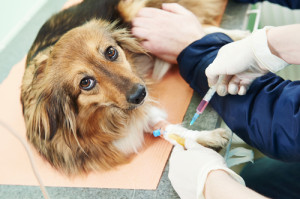Do you understand what your vet is saying to you when talking about your dog? Are you too embarrassed to ask him what he means when you don’t? The following terms are heard frequently be dog owners because they are common. And, for that reason, I think vets sometimes forget that their client may not know what they mean – especially if you are a new dog owner.
Abscess
Common enough, an abscess is the accumulation of pus underneath the skin, usually where your dog had a wound of some kind. The pus pools due to an infection caused by bacteria in the wound.
Titer
This is the measurement of antibodies in your dog’s blood. Some vets are using titers to determine whether vaccines are necessary or not. A titer can also refer to the amount of antigen present in a vaccine (ie. A low or high titer vaccine). You may get asked by a dog boarding or daycare place if your dog is up-to-date on vaccines or has a recent titer. Now you will know what they are asking.
Benign
When most of us hear “benign,” we think “non-cancerous.” But that is not the literal meaning. A Benign growth (tumor, cyst, lipoma, etc) is considered a “mild illness” that grows slowly and responds to treatment. (www.bruining.com)
Malignant
Like Bengign, this word has become synonymous with cancer, but it really means a growth that is “resistant to treatment, occurring in severe form, and frequently fatal.” (www.peteducation.com). It has become associated with cancer because all cancers (and there are over 100) are malignant.

Blood Work
When trying to diagnose your dog, the vet may suggest blood work. Most us just say “okay,” but do you know what that means? When a vet uses this term, they are talking about a way of diagnosing your dog’s ailments by conducting tests on their blood. “A biochemical profile is a blood test that assesses the function of internal organs, measures the electrolytes such as blood potassium, and identifies the levels of circulating enzymes” (www.petplace.com).
Bloat
While most know that dogs that eat too fast are at risk for bloat, especially larger dogs, many do not know really know what it is. Bloat occurs when the stomach fills with gas and the expansion puts pressure on the diaphragm, making it hard for the dog to breath. The stomach can also twist and when this happens the dog goes into shock and death follows quickly. (www.petmd.com)
Hyper
This prefix is before a lot of common doggy ailments including hypertension and hyperthyroid. The prefix means “an excess, above, or beyond.” So in the cases above, your dog has high blood pressure, or excessive thyroid hormone. So even if you don’t know the rest of the word, you can get the gist of what your vet is talking about by knowing this prefix.
Hypo
Hypo is the opposite of hyper. It means “under, beneath, or below.” So a dog with hypotension has low blood pressure, and a dog with hypothyroidism does not produce enough hormone.
Cryptorchid
A dog with a cryptorchid has an undescended testicle. This is a genetic trait and dogs with this condition should not be bred. Your vet will recommend neutering, which will cost more than a typical procedure. This is something to keep in mind when looking for a dog, if you know it is a cryptorchid, you will have a higher neutering cost.
Low passage (titer) vaccine
Your vet may recommend this if you have a very young puppy you want vaccinated. Young puppies that are still nursing or just weaned carry high levels of their maternal antibodies, which prevent the puppy’s own immune system from responding to the vaccine. The low passage vaccines contain virus particles that are weaker than those in a normal vaccine, thus eliciting an immune system response that would not have happened with a normal vaccine. (www.webmd.com)
About the Author
Based in Wilsonville, Ore., animal lover Kristina N. Lotz is a Certified Professional Dog Trainer – Knowledge Assessed (CPDT-KA) and works as a full time trainer. She also owns her own custom pet products company, A Fairytail House, where she makes personalized collars, leashes, beds, keepsake pillows and blankets, and anything else your imagine can think up. In her spare time, she trains and competes in herding, agility, obedience, rally, and conformation with her Shetland Sheepdogs. She smartly married a Veterinary Technician, who helps keep the fur kids happy and healthy, and provides a quick resource for articles.
